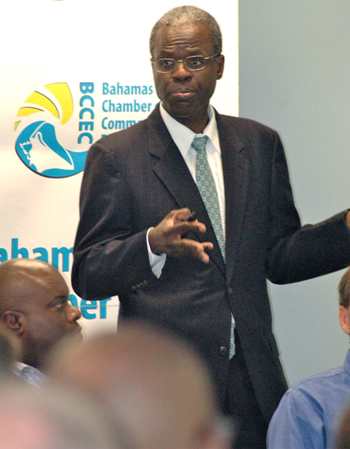|
From:TheBahamasWeekly.com Bahamas Information Services Updates
Nassau, The Bahamas -- Spreading the word of how the Value Added Tax (VAT) should be implemented to reform public sector finance lays the foundation for business owners to partner with the Government to increase the nation's global business profile. The Ministry of Finance are expected to introduce draft legislation and regulations to craft policies for a VAT system to work in The Bahamas, which is critical for businesses to plan for the next financial year. On July 15, Bahamas Financial Secretary John Rolle made a presentation on the VAT implementation, as well as the changes and benefits for business owners at the Arawak Cay Port Development, the Customs Department, and local business owners in the conference room of the Gladstone Freight Terminal on Gladstone Road. Business owners and Customs officials learned about the relevance of VAT for the shipping industry, the policy approach and motivation to comply with new government regulations.
Mr Rolle said that stakeholder consultations are ongoing as he presents the VAT system visualisation to hoteliers, duty free merchants, wholesale distributors, manufacturers, tour operators, accounting professionals, and media professionals. He said a Family Island outreach is also on the way to be included in the VAT public education campaign. Mr Rolle explained that due to trade liberalisation, the Free Trade Area of the Americas (FTAA), and the World Trade Organisation (WTO) accession, countries like The Bahamas must change their tax regimes to protect their income from the shock volatility of the global economy. He said that supporting medium term fiscal consolidation would increase the amount of tax revenue included in the GDP an extra three percent by 2017, translating into positive incremental growth for The Bahamas. He also said that the proposed figure includes a net boost from VAT of at least two percent, which would improve tax buoyancy and give the Government wiggle room to plan. The VAT would also reduce the Government's reliance on import duties, while broadening the tax base on both goods and services.
Mr Rolle said the VAT is a replacement tax that rebalances Government revenue without introducing any new taxes on the Bahamian people. He said it lowers the average rates of customs duties and excise taxes by imposing the 15 percent VAT on these goods and a range of services. In addition he said that new revenues from services will offset reduced customs revenue and generate additional net revenue. The Ministry of Finance wants the public to know it can expect the VAT to be introduced by July 1, 2014 and that hotel taxes and business license taxes will be revamped so that government revenue on goods does not become diminished, where excise taxes were removed. They want Bahamians to know that the VAT is a tax on consumption ultimately paid by the end consumer. Mr Rolle said that VAT Registrants will have a number assigned to their business and the firm's sales must exceed a threshold to be able to charge and collect VAT from the consumer. He also said that VAT is not to be treated as an operating cost for the registrants because its inputs are netted from the VAT collected from customers and the difference is remitted to Government. Mr Rolle said that Exempt firms may not charge VAT and receive no credit for taxes on input taxes because customers pay VAT indirectly. Mr Rolle said in addition, since VAT is zero rated, sales attract no VAT, but firms are entitled to input tax credit, which benefits the export sector, so VAT is expected to reduce the tax burden on lower income households. Mr Rolle said the VAT is levied at each step in the production or distribution of a good or service, as an input tax on intermediate purchases of goods and services and an output tax for sellers of goods and services. He also said that the seller collects VAT and remits it back to the Government after taking credits or deductions from their VAT account. Mr Rolle said the VAT becomes relevant in broader reforms to strengthen revenue administration and compliance, particularly in applying excise stamp on tobacco products, on modernising customs operations, business license and real property tax operations, and by creating a Central Revenue Agency (CRA) for non customs collections. Mr Rolle said the VAT promotes price transparency and opportunities to maintain exemptions for social and developmental reasons in sectors such as education, health, medicine, medical supplies, minimal amount on utilities, baby products, and computers. He said the VAT works through local importers that buy food and supplies from the United States and pays VAT input tax on invoice, duty and CIF, then the importer sells supplies to local restaurants and businesses with a markup and charges VAT output tax to restaurants and businesses, which finally is passed on to the customer with markup for profit and operating costs as the customer pays the VAT from the retailer. Mr Rolle said the process starts with the wholesaler that pays VAT to customs, then gets the VAT back from the local retailer, that in turn sells the product to the consumer that pays the VAT back to the retailer.
|


